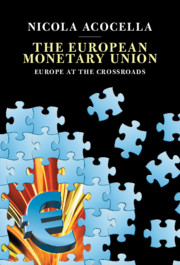Book contents
- The European Monetary Union
- The European Monetary Union
- Copyright page
- Dedication
- Contents
- Figures
- Tables
- Preface
- Acknowledgments
- Abbreviations
- Part I The Historical and Institutional Background
- Part II Institutions and Policies in Action
- 4 Asymmetries, Macroeconomic and Microeconomic Imbalances
- 5 The Great Recession
- 6 Policies and Institutions Put to the Test of the Great Recession
- 7 Asymmetries, Imbalances, Signals, and Incentives to Change
- Part III Lines of Reform of EMU Institutions
- References
- Index
5 - The Great Recession
How It Developed in Europe
from Part II - Institutions and Policies in Action
Published online by Cambridge University Press: 19 August 2020
- The European Monetary Union
- The European Monetary Union
- Copyright page
- Dedication
- Contents
- Figures
- Tables
- Preface
- Acknowledgments
- Abbreviations
- Part I The Historical and Institutional Background
- Part II Institutions and Policies in Action
- 4 Asymmetries, Macroeconomic and Microeconomic Imbalances
- 5 The Great Recession
- 6 Policies and Institutions Put to the Test of the Great Recession
- 7 Asymmetries, Imbalances, Signals, and Incentives to Change
- Part III Lines of Reform of EMU Institutions
- References
- Index
Summary
Chapter 5 investigates the consequences of the Great Recession on indicators of macroeconomic and microeconomic efficiency and equity. In Europe the financial crisis appeared initially under forms similar to those characterizing the United States, but soon assumed a very different form, due to the state intervention to save ailing banks, and the EMU peculiar institutions. More recently, the crisis has again changed its nature, as sovereign debt has been absorbed by banks, thus causing a problem for them and, in turn, again for the public finances that had to face bank failures. An important role was played by the specific financial imbalances that appeared in the EMU as a consequence of the formation of a currency area. Pre-existing imbalances became more intense when Germany decided to cope with the difficulties of a mature economy and unification with its Eastern Lander by adopting an export-led growth model supported by real devaluation. Then, European financial integration allowed for persistent net lending from core countries to peripheral countries, which compensated for the current account of the latter towards not only the former but also countries external to the EA.
Keywords
- Type
- Chapter
- Information
- The European Monetary UnionEurope at the Crossroads, pp. 142 - 184Publisher: Cambridge University PressPrint publication year: 2020

